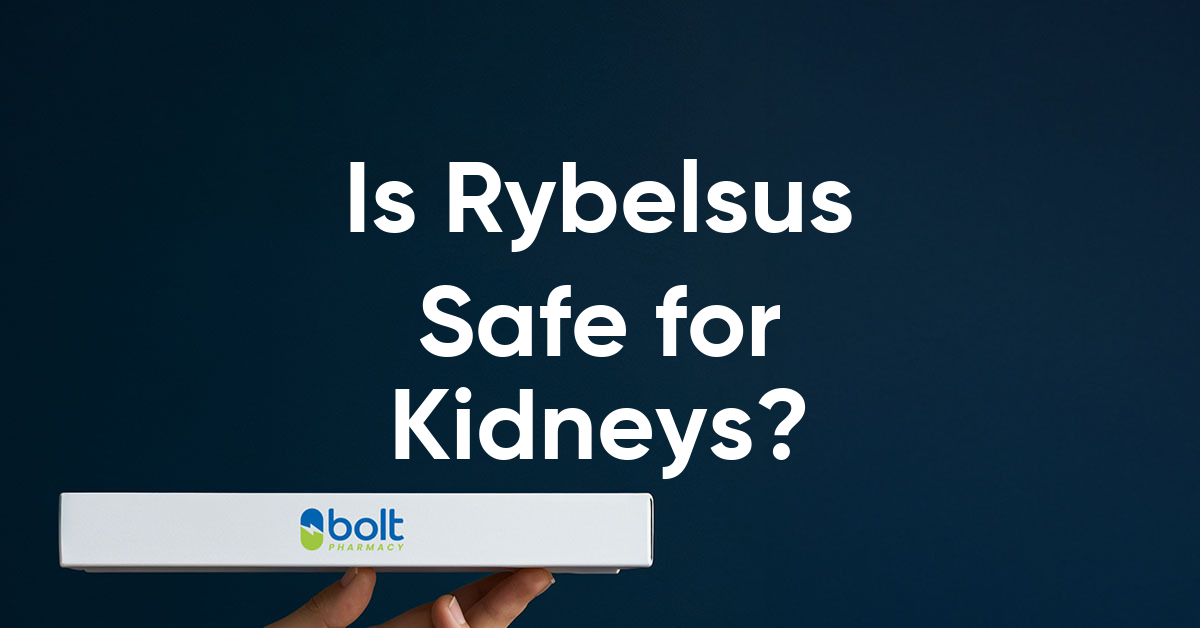Rybelsus (semaglutide) is an oral glucagon-like peptide-1 (GLP-1) receptor agonist licensed in the UK for treating type 2 diabetes mellitus in adults. As with any diabetes medication, understanding its impact on kidney health is essential, particularly given the prevalence of diabetic kidney disease. This article examines the renal safety profile of Rybelsus, explores who may need additional monitoring or specialist input, and provides guidance on maintaining kidney health whilst taking this medication. Evidence from clinical trials and UK regulatory guidance informs the recommendations presented here.
Summary: Rybelsus is generally considered safe for the kidneys and does not require dose adjustment in patients with mild, moderate, or severe renal impairment.
- Rybelsus (semaglutide) is an oral GLP-1 receptor agonist licensed in the UK for type 2 diabetes mellitus in adults.
- Clinical trials have not identified semaglutide as directly nephrotoxic, and emerging evidence suggests potential renal protective benefits.
- Acute kidney injury may occur secondary to dehydration from gastrointestinal side effects such as nausea, vomiting, or diarrhoea.
- Patients with end-stage renal disease requiring dialysis have limited clinical data and may require specialist assessment.
- Regular monitoring of renal function (serum creatinine, eGFR, urinary ACR) is recommended at least annually or more frequently based on individual risk.
- Patients should maintain adequate hydration, follow sick day rules during intercurrent illness, and seek prompt medical advice if experiencing severe gastrointestinal symptoms.
Table of Contents
What Is Rybelsus and How Does It Work?
Rybelsus (semaglutide) is an oral medication licensed in the UK for the treatment of type 2 diabetes mellitus in adults, as an adjunct to diet and exercise to improve glycaemic control. It belongs to a class of drugs known as glucagon-like peptide-1 (GLP-1) receptor agonists. Rybelsus is the first GLP-1 receptor agonist available in tablet form, offering an alternative to injectable formulations such as Ozempic (also semaglutide) and other similar agents.
The mechanism of action centres on mimicking the naturally occurring hormone GLP-1, which is released by the intestine in response to food intake. Semaglutide binds to GLP-1 receptors on pancreatic beta cells, stimulating insulin secretion in a glucose-dependent manner. This means insulin is released only when blood glucose levels are elevated, thereby reducing the risk of hypoglycaemia compared to some other diabetes medications. Additionally, Rybelsus suppresses glucagon secretion, slows gastric emptying, and promotes satiety, which can contribute to weight loss—a beneficial effect for many individuals with type 2 diabetes, although it is important to note that Rybelsus is not licensed for weight management in the UK.
Rybelsus is typically initiated at a dose of 3 mg once daily for the first month to allow the body to adjust, then increased to 7 mg daily. If further glycaemic control is required, the dose may be escalated to a maximum of 14 mg once daily. The tablet must be taken on an empty stomach with a small amount of water (up to 120 ml), at least 30 minutes before any food, drink, or other oral medications to ensure adequate absorption. Tablets should be swallowed whole and not split or crushed. If a dose is missed, the missed dose should be skipped and the next dose taken the following day.
According to NICE guidance (NG28), GLP-1 receptor agonists like Rybelsus may be considered as part of treatment intensification when metformin and other oral agents have not achieved adequate glycaemic control, subject to specific clinical criteria. It is worth noting that the risk of hypoglycaemia may increase when Rybelsus is used in combination with insulin or sulfonylureas, and dose reduction of these agents may need to be considered.
Is Rybelsus Safe for Kidneys?
Rybelsus is generally considered safe for the kidneys and does not require dose adjustment in patients with mild, moderate, or severe renal impairment. According to the UK Summary of Product Characteristics (SmPC), there is limited experience with Rybelsus in patients with end-stage renal disease (ESRD) requiring dialysis.
Clinical trial data and post-marketing surveillance have not identified semaglutide as directly nephrotoxic. In fact, emerging evidence suggests that GLP-1 receptor agonists may offer renal protective benefits in people with type 2 diabetes, potentially slowing the progression of diabetic kidney disease. However, it's important to note that the strongest evidence for renal protection comes from studies with injectable semaglutide (such as SUSTAIN-6 and FLOW trials), and renal protection is not a licensed indication for Rybelsus.
The PIONEER clinical trial programme, which specifically evaluated oral semaglutide (Rybelsus), demonstrated that the drug did not adversely affect kidney function across a broad range of patients. PIONEER-5, in particular, studied oral semaglutide in patients with moderate renal impairment and showed acceptable safety and efficacy in this population.
However, there are important safety considerations. The UK SmPC for Rybelsus includes warnings about acute kidney injury (AKI), which has been reported in patients treated with GLP-1 receptor agonists. This is typically associated with dehydration resulting from gastrointestinal side effects—particularly nausea, vomiting, and diarrhoea—especially during the initial titration phase. If severe gastrointestinal symptoms occur, renal function should be monitored, and temporary interruption of treatment may be necessary.
It is essential that patients maintain adequate hydration and follow 'sick day rules' if experiencing persistent gastrointestinal symptoms. This includes seeking prompt medical advice if unable to maintain adequate fluid intake, particularly during episodes of intercurrent illness.
Who Should Avoid Rybelsus Due to Kidney Concerns?
While Rybelsus does not require dose adjustment in renal impairment, certain patient groups require careful assessment before initiation. Patients with end-stage renal disease (ESRD) requiring dialysis have limited clinical data supporting the use of Rybelsus. Although the drug is not contraindicated in these populations according to the UK SmPC, specialist advice may be appropriate when considering Rybelsus in patients with ESRD.
Individuals with a history of acute kidney injury (AKI) or those at high risk of dehydration should be counselled about the gastrointestinal side effects of Rybelsus. If a patient experiences severe nausea, vomiting, or diarrhoea, they should be advised to seek medical attention promptly to prevent dehydration-related kidney injury. This is particularly important for older adults, those taking medications that affect renal blood flow or function (such as diuretics, ACE inhibitors, ARBs, or NSAIDs), or patients with concurrent illnesses that increase fluid loss.
According to the UK SmPC, the only contraindication to Rybelsus is:
- Hypersensitivity to semaglutide or any of the excipients
While not kidney-specific, prescribers should be aware of other important precautions when considering Rybelsus:
-
Patients with pre-existing diabetic retinopathy may be at increased risk of retinopathy complications when glycaemic control improves rapidly
-
Patients with diabetic ketoacidosis or type 1 diabetes should not use Rybelsus, as it is not a substitute for insulin
Before prescribing Rybelsus, clinicians should review baseline renal function tests (serum creatinine, eGFR, and urinary albumin-to-creatinine ratio) and assess the patient's overall fluid status, comorbidities, and concomitant medications. Shared decision-making is essential, ensuring patients understand both the benefits and potential risks.
Monitoring Kidney Health While Taking Rybelsus
Regular monitoring of kidney function is a cornerstone of safe diabetes management, particularly when using medications like Rybelsus. Although semaglutide does not require dose adjustment for renal impairment, ongoing surveillance helps detect any changes in renal status early and allows for timely intervention.
Baseline assessments should include:
-
Serum creatinine and eGFR: to establish kidney function
-
Urinary albumin-to-creatinine ratio (ACR): to detect early diabetic nephropathy
-
Blood pressure: as hypertension accelerates kidney disease progression
-
HbA1c and lipid profile: for comprehensive cardiovascular and metabolic risk assessment
Once Rybelsus is initiated, NICE guidance recommends monitoring renal function at least annually in patients with type 2 diabetes, or more frequently based on individual risk. According to NICE guideline NG203 (Chronic kidney disease), the frequency of monitoring should be tailored to the patient's eGFR and ACR categories, with higher-risk categories potentially requiring monitoring up to three times per year.
Blood pressure control is crucial for kidney protection. NICE NG203 recommends a target of <140/90 mmHg for most patients with CKD, with consideration of a lower target of <130/80 mmHg in those with CKD and significant albuminuria (for example, ACR ≥70 mg/mmol, or ACR >30 mg/mmol with diabetes). Ambulatory or home blood pressure monitoring is preferred where available.
Patients should be educated to recognise warning signs that may indicate kidney problems or dehydration, including:
-
Reduced urine output or dark-coloured urine
-
Persistent nausea, vomiting, or diarrhoea
-
Dizziness, confusion, or extreme fatigue
-
Swelling of the ankles, feet, or face
If any of these symptoms occur, patients should contact their GP or diabetes care team promptly. In cases of severe dehydration or suspected AKI, urgent medical assessment may be required, and temporary discontinuation of Rybelsus may be necessary until the patient is stabilised. Patients should follow 'sick day rules' during intercurrent illness, ensuring adequate hydration and seeking medical advice if unable to maintain fluid intake.
Healthcare professionals should also review and optimise other aspects of kidney health, including use of ACE inhibitors or angiotensin receptor blockers (ARBs) for renoprotection when indicated, and avoidance of nephrotoxic agents where possible. A multidisciplinary approach involving GPs, diabetes specialist nurses, dietitians, and nephrologists (when appropriate) ensures comprehensive, patient-centred care.
Patients are encouraged to report any suspected side effects to the MHRA Yellow Card scheme (yellowcard.mhra.gov.uk or via the Yellow Card app).
Frequently Asked Questions
Does Rybelsus require dose adjustment in patients with kidney disease?
No, Rybelsus does not require dose adjustment in patients with mild, moderate, or severe renal impairment. However, there is limited clinical experience in patients with end-stage renal disease requiring dialysis, and specialist advice may be appropriate in these cases.
Can Rybelsus cause kidney damage?
Rybelsus is not directly nephrotoxic. However, acute kidney injury has been reported in patients treated with GLP-1 receptor agonists, typically associated with dehydration from gastrointestinal side effects such as nausea, vomiting, or diarrhoea, particularly during initial titration.
How often should kidney function be monitored whilst taking Rybelsus?
NICE guidance recommends monitoring renal function at least annually in patients with type 2 diabetes, or more frequently based on individual risk factors such as eGFR and urinary albumin-to-creatinine ratio. Higher-risk patients may require monitoring up to three times per year.
The health-related content published on this site is based on credible scientific sources and is periodically reviewed to ensure accuracy and relevance. Although we aim to reflect the most current medical knowledge, the material is meant for general education and awareness only.
The information on this site is not a substitute for professional medical advice. For any health concerns, please speak with a qualified medical professional. By using this information, you acknowledge responsibility for any decisions made and understand we are not liable for any consequences that may result.
Heading 1
Heading 2
Heading 3
Heading 4
Heading 5
Heading 6
Lorem ipsum dolor sit amet, consectetur adipiscing elit, sed do eiusmod tempor incididunt ut labore et dolore magna aliqua. Ut enim ad minim veniam, quis nostrud exercitation ullamco laboris nisi ut aliquip ex ea commodo consequat. Duis aute irure dolor in reprehenderit in voluptate velit esse cillum dolore eu fugiat nulla pariatur.
Block quote
Ordered list
- Item 1
- Item 2
- Item 3
Unordered list
- Item A
- Item B
- Item C
Bold text
Emphasis
Superscript
Subscript












